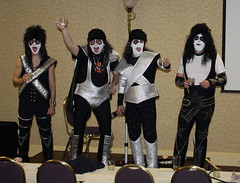 The foundation of business is psychology. That is to say, if you understand psychology – especially the psychology of your customers – you’ll significantly increase your business’ chances of success.
The foundation of business is psychology. That is to say, if you understand psychology – especially the psychology of your customers – you’ll significantly increase your business’ chances of success.
Yup, and the sky is blue. Pretty obvious stuff. Hopefully.
What isn’t as obvious is how the actually mind works, how psychology actually plays out.
Fortunately, I just found a gem of resources from PsyBlog – How the Mind Reveals Itself in Everyday Activities. This collection of articles offers explanations and insights into practical applications of psychology, each of which could lead to potential business benefits. For instance:
This research concludes that, “if you want help, just ask. People are much more likely to help than you think, especially if the request is relatively small.” Also, “the other side of the coin is that most of us don’t realise just how hard it is to say no to a request for help.”
I suspect this only pertains to real-world interactions, rather than online interactions. I’m not sure how this would play out online. Or perhaps Yahoo! Answers (YHOO) is a good example – meaning it would play out pretty well.
This insight also means you could enlist the help of friends and family during these days of economic distress. If you’re worried about being overbearing, give them an easy way to say No. But chances are, you’ll be surprised at how many will really say Yes.
Apparently, Wednesdays are the worst days of the week, with Tuesday actually being pretty good. Perhaps your business could take advantage of that.
Want to do a giveaway of free ice cream, smoothies, or pastries? Call it a “Feel Good” deal and give them away on a Tuesday! Or perhaps do it on Monday, since that’s the perceived worst day of the week. Sometimes perception go much further than reality.
I’ve heard that salty snacks like chips and peanuts can make people thirsty, and thus more likely to order more drinks. Well, guess what? So can loud music.
It’s just a casual relationship though; studies haven’t determined if the volume of the music itself is what causes extra drinking, or the fact that people can’t hear each other as well, and thus they drink instead.
I wonder if this applies to food too. Perhaps you could play loud music at a fast food restaurant, thus encouraging patrons to eat quickly and leave. Hmm!
And that’s just a few of the ways understanding psychology can help your business. Good stuff, everyday psychology!
 No one likes to wash their dog. But dog owners all have to after a visit to the dog beach.
No one likes to wash their dog. But dog owners all have to after a visit to the dog beach.



 The foundation of business is psychology. That is to say, if you understand psychology – especially the psychology of your customers – you’ll significantly increase your business’ chances of success.
The foundation of business is psychology. That is to say, if you understand psychology – especially the psychology of your customers – you’ll significantly increase your business’ chances of success.